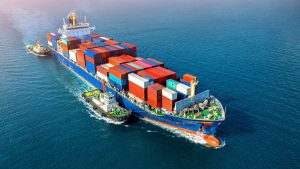
El pasado 8 de diciembre, se inició la crisis de los pellets en el Norte Peninsular cuando el Gobierno central alertó del vertido de pellets a través del 112.
Sin embargo, esta noticia puntual, se repite, desgraciadamente, mucho más de lo que creemos. En las últimas semanas, se habla mucho de la llegada de los pellets a las costas de Galicia, Asturias y Cantabria. Este contenedor, transportaba más de mil sacos de 15 kilogramos de pellets de plástico, además de neumáticos y papel film.
El transporte marítimo representa el 80% del comercio internacional, lo que significa que anualmente se trasladen cientos de millones de contenedores cargados de materiales que, por accidente, pueden caer al agua y acabar en el mar u océano, o incluso, llegar a las costas arrastrados por las corrientes.
Según los datos que aporta el Consejo Mundial del Transporte Marítimo (WSC), entre 2008 y 2022 se perdieron en mares y océanos una media de 1.566 contenedores al año.
Todos los contenedores que permanecen en el en los mares y océanos, se acaba degradando y empiezan a formar parte de la cadena trófica, suponiendo un problema ambiental, tanto para la flora y fauna, como para los seres humanos. Debido a su forma, las aves y los peces se las comen al confundirlas con huevos y, aquellas que no se retiran, se acaban convirtiendo en microplásticos.
Analizando este problema por trienio temporal, el peor fue el que abarca desde 2011 a 2013, con una media de 2.683 unidades perdidas anualmente, debido a que el buque MOL Comfort perdió, en 2013, 4.293 contenedores. Otros accidentes han provocado la pérdida, en 2020, de más de 1.800 contenedores por condiciones meteorológicas adversas.
El mejor año respecto a esta problemática, fue el 2022, cuya cifra bajó a 661 unidades de un total de 250 millones de contenedores transportados durante ese año.
Pese a que la crisis de la zona norte de la Península es, ahora, noticia, este acontecimiento negativo ocurre muy a menudo, perjudicando y alterando las reservas marinas y todos los seres que viven en él y de él, como ocurre con los humanos, quienes hacemos uso de los recursos para nuestra alimentación.
Esta situación debería cambiar si queremos conservar sano los mares y océanos. Para ello, existen numerosas asociaciones y peticiones que buscan un cambio en la gestión del transporte marítimo para evitar este tipo de accidentes que, en cuestión de horas, se convierte en una catástrofe para nuestros mares y océanos.
__
On December 8th, the pellet crisis began in the North of the Iberian Peninsula when the central government alerted about the pellet dumping through 112.
However, this one-off piece of news is, unfortunately, being repeated much more often than we think. In recent weeks, there has been a lot of talk about the arrival of pellets on the coasts of Galicia, Asturias and Cantabria. This container was carrying more than a thousand 15-kilogram sacks of plastic pellets, as well as tyres and paper film.
Maritime transport accounts for 80% of international trade, which means that hundreds of millions of containers loaded with materials are transported every year, which, by accident, can fall into the water and end up in the sea or ocean, or even reach the coasts dragged by currents.
According to data provided by the World Shipping Council (WSC), an average of 1,566 containers per year were lost at sea and in the oceans between 2008 and 2022.
All containers that remain in the seas and oceans eventually degrade and become part of the food chain, posing an environmental problem for both flora and fauna, as well as for humans. Because of their shape, birds and fish eat them because they mistake them for eggs, and those that are not removed end up becoming microplastics.
Analysing this problem by time triennium, the worst was from 2011 to 2013, with an average of 2,683 units lost annually, due to the MOL Comfort losing 4,293 containers in 2013. Other accidents have led to the loss of more than 1,800 containers due to adverse weather conditions in 2020.
The best year for this issue was 2022, which dropped to 661 units out of a total of 250 million containers transported during that year.
Although the crisis in the northern part of the peninsula is now in the news, this negative event happens very often, damaging and altering the marine reserves and all the beings that live in it and from it, as it happens with humans, who make use of the resources for our food.
This situation should change if we want to preserve healthy seas and oceans. To this end, there are numerous associations and petitions seeking a change in the management of maritime transport in order to avoid this type of accident which, in a matter of hours, becomes a catastrophe for our seas and oceans.
__

